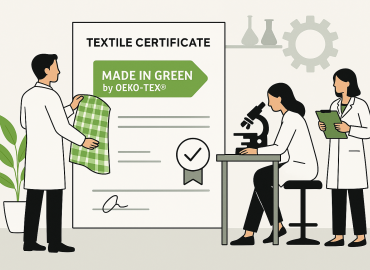MADE IN GREEN & STeP by OEKO-TEX®
Nur Nil’s Journey Toward Fully Certified Sustainable Production
In today’s global textile industry, transparency is not a luxury—it’s a necessity. Brands, retailers, and consumers alike are demanding clear evidence that the textiles they use are safe, responsibly made, and environmentally sound. Two of the most credible and impactful certifications in this space are STeP by OEKO-TEX® and MADE IN GREEN by OEKO-TEX®.
At Nur Nil, our commitment to sustainability is more than a promise—it’s a system backed by standards. That’s why we are currently in the application process to obtain both the STeP and MADE IN GREEN certifications, reinforcing our role as a responsible manufacturer serving global markets.
In this article, we explore what each of these certifications means, how they work together, and why they matter for manufacturers, partners, and end consumers.
What Is STeP by OEKO-TEX®?
STeP (Sustainable Textile and Leather Production) by OEKO-TEX® is a facility-level certification that evaluates and verifies environmental and social responsibility across the entire production process.
Key Areas Assessed:
Chemical management
Environmental performance (wastewater, emissions, energy use)
Occupational health and safety
Social working conditions
Quality management
Environmental management systems
Unlike single-issue certifications, STeP provides a holistic overview of a facility’s sustainability profile. It is modular, meaning each of these categories is individually rated, with an overall score provided that reflects the company’s maturity level—from “Entry” to “Best Practice.”
For Nur Nil, STeP certification is a foundational step. It helps us:
Structure our sustainability efforts
Validate safe chemical use in line with ZDHC
Enhance transparency for our international buyers
Benchmark ourselves against global best practices
We are currently undergoing internal audits, chemical screening, and documentation collection as part of our roadmap toward full certification.
What Is MADE IN GREEN by OEKO-TEX®?
MADE IN GREEN is a product-level traceable label that verifies a finished textile or garment is:
Tested for harmful substances (via STANDARD 100 by OEKO-TEX®)
Manufactured in environmentally friendly and socially responsible facilities (STeP-certified)
This means every MADE IN GREEN-labeled product carries a unique product ID or QR code, allowing consumers and clients to trace its manufacturing journey—from weaving to finishing and packing.
How STeP and MADE IN GREEN Work Together
While STeP focuses on facilities, MADE IN GREEN connects that facility certification to the final product. Together, they ensure that what’s written on a label reflects genuine environmental, ethical, and quality standards.
For a product to qualify for the MADE IN GREEN label:
It must be made in a facility that has earned STeP certification
All components must be tested and certified under STANDARD 100 by OEKO-TEX®
This approach brings complete supply chain integrity and is increasingly adopted by leading retailers and hospitality brands worldwide.
Why It Matters to Nur Nil and Our Clients
For global brands, OEKO-TEX® certification is a trusted standard for responsible sourcing. It meets the rising demand for supply chain transparency, supports ESG compliance, and aligns with global initiatives such as:
UN Sustainable Development Goals (SDGs)
ZDHC (Zero Discharge of Hazardous Chemicals)
EU Green Deal requirements
Retailer-specific sourcing standards (Target, H&M, Lidl, etc.)
By pursuing these certifications, Nur Nil is not just ticking boxes—we are future-proofing our operations, building buyer confidence, and contributing to a more ethical textile ecosystem.
Looking Ahead: A Smarter, Safer, and More Transparent Future
As consumer expectations shift and regulations become more stringent, the textile industry must evolve to prioritize transparency, accountability, and sustainability.
At Nur Nil, certifications like STeP and MADE IN GREEN by OEKO-TEX® are not the end goal—they are part of a larger philosophy. One that believes luxury can be clean, comfort can be responsible, and growth can be ethical.


